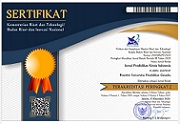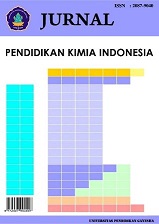Development of E-Worksheet Based on Flipped-Guided Inquiry Learning (FGIL) in Thermochemistry for Phase F
DOI:
https://doi.org/10.23887/jpki.v8i1.74638Keywords:
E-worksheet, Flipped Classroom, Guided Inquiry Learning, Thermochemistry, ADDIEAbstract
Thermochemistry has abstract and mathematical material which makes it difficult for students to understand this material. Students are required to discuss this material in depth so teaching materials are needed that support student learning flexibly. Thus, the research purpose is to develop a thermochemistry e-worksheet based on FGIL for high school students in phase F. The research type is R&D with the ADDIE model which is limited to the Development stage. Content validity was carried out with four validators and practicality was obtained from 36 phases F high school students. The research instruments were validation sheets and student response questionnaires. The validity value is determined by Aiken's V test, if the V value is > 0.40 then an aspect is declared valid. The research findings demonstrated that the average assessment on the material aspect was 0.92 (very valid); the media aspect 0.96 (very valid); and the language aspect was 0.83 (very valid), while the average percentage of student responses was 96% (very practical). So, it can be said that the developed thermochemistry e-worksheet based on FGIL is valid and practical to use.
References
Aiken, L. R. (1985). Three Coefficients for Analyzing the Reliability and Validity of Ratings. Educational and Psychological Measurement. DOI: https://doi.org/10.1177/0013164485451012
Aliifah, N. J., Ramli, M., & Yunita, L. (2023). Pengembangan Media Pembelajaran Komik Webtoon Terintegrasi STEM pada Mata Pelajaran Kimia Materi Gaya Antarmolekul. SPIN-Jurnal Kimia & Pendidikan Kimia, 5(1), 112–126. https://doi.org/10.20414/spin.v5i1.7020
Anisah, D. C., & Nasrudin, H. (2023). Development of guided inquiry-oriented e-worksheets to improve students’ science process skills in acid-base material. Jurnal Pijar Mipa, 18(4), 449–458. https://doi.org/10.29303/jpm.v18i4.5073 DOI: https://doi.org/10.29303/jpm.v18i4.5073
Arlianty, W. N. (2015). Pemanfaatan Penggunaan Model Pembelajaran Inkuiri Terbimbing Berbasis Konstruktivis pada Materi Hidrolisis Garam Semester Genap SMA Negeri 1 Kartasura Tahun Ajaran 2013/2014. Jurnal Pendidikan Sains, 3(2).
Aswita, Rusman, & Rahmayani, R. F. I. (2017). Identifikasi Kesulitan Siswa dalam Memahami Materi Termokimia dengan Menggunakan Three-Tier Multiple Choice Diagnostic Instrument di Kelas XI MIA 5 MAN MODEL Banda Aceh. Jurnal Ilmiah Mahasiswa Pendidikan Kimia, 2(1), 35–44.
Ayunda, W. K., & Azhar, M. (2023). Pengembangan LKPD Materi Kesetimbangan Kimia Berbasis Inkuiri Terstruktur Pada Liveworksheet Untuk Fase F SMA. Jurnal Pendidikan Tambusai, 7(2), 16582–16588.
Bau, C. P. E., Olii, S., & Pakaya, N. (2022). Perbandingan Motivasi Belajar Pada Mata Pelajaran Kimia Sebelum dan Sesudah Penerapan Media Pembelajaran Augmented Reality Chemistry. INVERTED: Journal of Information Technology Education, 2(1), 44–53. http://ejurnal.ung.ac.id/index.php/inverted DOI: https://doi.org/10.37905/inverted.v2i1.12978
Bishop, J. L., & Verleger, M. (2013). The flipped classroom: A survey of the research. 120th ASEE Annual Conference and Exposition. https://www.researchgate.net/publication/285935974 DOI: https://doi.org/10.18260/1-2--22585
Biya, S. A., Isa, I., & Laliyo, L. A. R. (2023). Pengaruh Model Pembelajaran Discovery Learning Terhadap Pemahaman Konsep Pada Materi Termokimia Di SMA Negeri 1 Mananggu. Jurnal Pendidikan Kimia Undiksha, 1(1), 23–28. https://ejournal.undiksha.ac.id/index.php/JJPK
Bungawati, & Rahmadani, E. (2023). Development of Powtoon-Based Science Learning Media in Elementary Schools. Jurnal Pendidikan Sains Indonesia (Indonesian Journal of Science Education), 11(2), 265–275. https://doi.org/10.24815/jpsi.v10i4.27687 DOI: https://doi.org/10.24815/jpsi.v11i2.27687
Chen, F., Zhang, S., Guo, Y., & Xin, T. (2017). Applying the Rule Space Model to Develop a Learning Progression for Thermochemistry. Research in Science Education, 47(6), 1357–1378. https://doi.org/10.1007/s11165-016-9553-7 DOI: https://doi.org/10.1007/s11165-016-9553-7
Drake, L. (2016). A 2020 Vision For Public Education in Ultster Country: The Flipped Classroom, An Approach to Teaching and Learning. Retrieved from http://www.newpaltz.edu/benja mincenter/2020.html
Epinur, E., & Minarni, M. (2023). Development of Student Worksheets on the Inquiry-Flipped Classroom Model on Addictive and Addictive Substance Material to Improve Student’s Argumentation Abilities. Jurnal Penelitian Pendidikan IPA, 9(8), 6292–6299. https://doi.org/10.29303/jppipa.v9i8.4499 DOI: https://doi.org/10.29303/jppipa.v9i8.4499
Eriana, S., Harini, E., & Kusumaningrum, B. (2023). Pengaruh E-Worksheet terhadap Kemampuan Pemecahan Masalah Matematika Berdasarkan Motivasi Belajar Siswa. Indonesian Journal of Teaching and Learning, 2(4), 524–537. https://doi.org/10.56855/intel.v2i4.620
Felitasari, A., & Rusmini, R. (2022). Development of E-Worksheet Assisted by Liveworksheets to Improve Science Process Skills and Collaboration on Chemical Equilibrium Materials. Scientiae Educatia, 11(1), 10. https://doi.org/10.24235/sc.educatia.v11i1.10235 DOI: https://doi.org/10.24235/sc.educatia.v11i1.10235
Hemayanti, K. L., Muderawan, I. W., & Selamat, I. N. (2020). Analisis Minat Belajar Siswa Kelas XI MIA pada Mata Pelajaran Kimia. Jurnal Pendidikan Kimia Indonesia, 4, 20–25. https://ejournal.undiksha.ac.id/index.php/JPK/index DOI: https://doi.org/10.23887/jpk.v4i1.24060
Indriani, S., Nuryadi, Marhaeni, N. H., & Kurniati, R. (2022). Efektivitas Penggunaan E-LKPD Untuk Meningkatkan Kemampuan Pemahaman Konsep Segiempat dan Segitiga. Jurnal Pendidikan Tambusai, 6(1), 3959–3966.
Irawati, E. (2015). Analisis Materi Termokimia Pada Buku Teks Pelajaran SMA/MA Kelas XI Dari Perspektif 4S TMD Pada Tahap Seleksi. Skripsi. Universitas Pendidikan Indonesia.
Istiyono, E. (2020). Pengembangan Instrumen Penilaian dan Analisis Hasil Belajar Fisika dengan Teori Tes Klasik dan Modern. Yogyakarta: UNY Press.
Jdaitawi, M. (2019). The effect of flipped classroom strategy on students' learning outcomes. International Journal of Instruction, 12(3), 665–680. https://doi.org/10.29333/iji.2019.12340a DOI: https://doi.org/10.29333/iji.2019.12340a
Jespersen, N. D., Brady, J. E., & Hyslop, A. (2012). Chemistry: The Molecular Nature of Matter. John Wiley and Sons Inc.
Juniantari, M., Pujawan, I. G. N., & Widhiasih, I. D. A. G. (2018). Pengaruh pendekatan flipped classroom terhadap pemahaman konsep matematika siswa SMA. Journal of Education Technology, 2(4), 197-204. https://doi.org/10.23887/jet.v2i4.17855 DOI: https://doi.org/10.23887/jet.v2i4.17855
Kuhlthau, C. C., Maniotes, L., & Caspari, A. K. (2015). Guided Inquiry: Learning in the 21st Century. DOI: https://doi.org/10.5040/9798400660603
Lau, X. C., Wong, Y. L., Wong, J. E., Koh, D., Sedek, R., Jamil, A. T., Ng, A. L. O., Hazizi, A. S., Ruzita, A. T., & Poh, B. K. (2019). Development and Validation of a Physical Activity Educational Module for Overweight and Obese Adolescents: CERGAS Programme. International Journal of Environmental Research and Public Health, 16(9). https://doi.org/10.3390/ijerph16091506 DOI: https://doi.org/10.3390/ijerph16091506
Le, V. H. H., & Prabjandee, D. (2023). A Review of the Website Liveworksheets. Computer Assisted Language Learning Electronic Journal (CALL-EJ), 24(1), 269–279.
Lestari, L., Alberida, H., & Rahmi, Y. L. (2018). Validitas dan Praktikalitas Lembar Kerja Peserta Didik (LKPD) Materi Kingdom Plantae Berbasis Pendekatan Saintifik untuk Peserta Didik Kelas X SMA/MA. JURNAL EKSAKTA PENDIDIKAN (JEP), 2(2), 170. https://doi.org/10.24036/jep/vol2-iss2/245 DOI: https://doi.org/10.24036/jep/vol2-iss2/245
Mispa, R., Putra, A. P., & Zaini, M. (2022). Penggunaan Lembar Kerja Peserta Didik Elektronik (E-LKPD) Live Worksheet pada Konsep Protista Terhadap Hasil Belajar Peserta Didik Kelas X SMAN 7 Banjarmasin. Jurnal Pendidikan Indonesia (Japendi), 3(1). DOI: https://doi.org/10.36418/japendi.v3i1.478
Mitasari, R. A., & Hidayah, R. (2022). Development of E-worksheet based on Problem Based Learning to Improve Student’s Metacognitive Ability. JSER Journal of Science Education Research Journal, 6(2), 66–74. www.journal.uny.ac.id/jser DOI: https://doi.org/10.21831/jser.v6i2.53067
Mohamad, M. M., Sulaiman, N. L., Sern, L. C., & Salleh, K. M. (2015). Measuring the Validity and Reliability of Research Instruments. Procedia - Social and Behavioral Sciences, 204, 164–171. https://doi.org/10.1016/j.sbspro.2015.08.129 DOI: https://doi.org/10.1016/j.sbspro.2015.08.129
Muruganantham, G. (2015). Developing of E-content package by using ADDIE model. International Journal of Applied Research, 1(3), 52–54.
Paristiowati, M., Fitriani, E., & Aldi, N. H. (2017). The effect of inquiry-flipped classroom model toward students’ achievement on chemical reaction rate. AIP Conference Proceedings, 1868. https://doi.org/10.1063/1.4995105 DOI: https://doi.org/10.1063/1.4995105
Pawestri, N. A., Erlina*, E., Harun, A. I., Sahputra, R., & Lestari, I. (2023). Development of E-module Based on Guided Inquiry in Chemical Bonding Topic for Class X Student Learning Materials. Jurnal Pendidikan Sains Indonesia, 11(4), 713–739. https://doi.org/10.24815/jpsi.v11i4.30677 DOI: https://doi.org/10.24815/jpsi.v11i4.30677
Prastika, Y., & Masniladevi. (2021). Pengembangan E-LKPD Interaktif Segi Banyak Beraturan Dan Tidak Beraturan Berbasis Liveworksheets Terhadap Hasil Belajar Peserta Didik Kelas IV Sekolah Dasar. Journal of Basic Education Studies, 4(1), 2601–2614.
Priliyanti, A., Muderawan, I. W., & Maryam, S. (2021). Analisis Kesulitan Belajar Siswa dalam Mempelajari Kimia Kelas XI. Jurnal Pendidikan Kimia Undiksha, 5(1), 11–18. https://ejournal.undiksha.ac.id/index.php/JJPK DOI: https://doi.org/10.23887/jjpk.v5i1.32402
Purnomo, Hastuti, B., & Susanti, E. (2022). Hubungan Kemampuan Matematika dan Berpikir Kritis dengan Prestasi Belajar Siswa pada Materi Termokimia Kelas XI SMA N 1 Teras Boyolali. Jurnal Pendidikan Kimia, 11(1), 38–44. https://doi.org/10.20961/jpkim.v11i1.49780
Putri, A. S., Putri, G. S., & Priyandita, N. (2021). Penggunaan Media Liveworksheet Untuk Peningkatan Partisipasi Aktif Dalam Pembelajaran Tematik di SD Kelas Tinggi. Proseding Didaktis: Seminar Nasional Pendidikan Dasar, 21–32.
Ramadani, Y., Pujiriyanto, P., Suwartia, S., & Minarni, M. (2023). Developing Students’ Worksheets based on the Inquiry-Flipped Classroom Learning Model to Improve Argumentation Skills. AL-ISHLAH: Jurnal Pendidikan, 15(1), 972–980. https://doi.org/10.35445/alishlah.v15i1.2459 DOI: https://doi.org/10.35445/alishlah.v15i1.2459
Rasmawan, R. (2022). Stoichiometry E-Book Based on Creative Problem Solving (CPS) to Solve Conceptual Problems. Jurnal Pendidikan Kimia Indonesia, 6, 70–78. https://doi.org/10.23887/jpk.v6i1 DOI: https://doi.org/10.23887/jpk.v6i1.43441
Riduwan. (2015). Skala Pengukuran variabel-variabel penelitian. Bandung: Alfabeta.
Rumasoreng, M. I., Purwanto, A., & Hilliyani. (2023). Pelatihan Pembuatan Lembar Kerja Peserta Didik Elektronik Berbantuan E-Worksheet Interaktif. Catimore: Jurnal Pengabdian Kepada Masyarakat, 2(1), 72–79. https://doi.org/10.56921/cpkm.v2i1.59 DOI: https://doi.org/10.56921/cpkm.v2i1.59
Saslina, T., Mawardi, & Dj, L. (2020). Pengembangan Modul Pembelajaran Kimia Materi Pokok Struktur Atom Berbasis Inkuiri Terbimbing. Journal On Education P, 02(02), 261–269. DOI: https://doi.org/10.31004/joe.v2i2.431
Setiawan, H. R., Rakhmadi, A. J., & Raisal, A. Y. (2021). Pengembangan Media Ajar Lubang Hitam Menggunakan Model Pengembangan Addie. Jurnal Kumparan Fisika, 4(2), 112–119. https://doi.org/10.33369/jkf.4.2.112-119 DOI: https://doi.org/10.33369/jkf.4.2.112-119
Shahroom, A. A., & Hussin, N. (2018). Industrial Revolution 4.0 and Education. International Journal of Academic Research in Business and Social Sciences, 8(9). https://doi.org/10.6007/ijarbss/v8-i9/4593 DOI: https://doi.org/10.6007/IJARBSS/v8-i9/4593
Silitonga, P. M., & Sitepu, R. Y. (2022). Hubungan Kemampuan Matematika dan Kemampuan Fisika Terhadap Hasil Belajar Siswa Pada Materi Termokimia. Jurnal Inovasi Pembelajaran Termokimia, 4(1), 10–17. https://jurnal.unimed.ac.id/2012/index.php/jipk DOI: https://doi.org/10.24114/jipk.v4i1.32620
Siga, R. R. (2023). Peningkatan Hasil Belajar Jurnal Penyesuaian Melalui Model Pembelajaran Langsung dengan Pendekatan Flipped Classroom. EKONOMIKA45: Jurnal Ilmiah Manajemen, Ekonomi Bisnis, Kewirausahaan, 10(2), 385-401. https://doi.org/10.30640/ekonomika45.v10i2.978 DOI: https://doi.org/10.30640/ekonomika45.v10i2.978
Sudjana, N. (2005). Metode Statistika. Bandung: Tarsito.
Susilawati, E., Taufiq, A. U., & Hasanah, U. (2023). Development of liveworksheet-based interactive LKPD on the biodiversity material of class X. BIO-INOVED: Jurnal Biologi-Inovasi Pendidikan, 5(1), 17-27. http://dx.doi.org/10.20527/bino.v5i1.14719 DOI: https://doi.org/10.20527/bino.v5i1.14719
Wolff, L.-C., & Chan, J. (2016). Flipped Classrooms for Legal Education. http://www.springer.com/series/10164 DOI: https://doi.org/10.1007/978-981-10-0479-7
Zakiyah, Ibnu, S., & Subandi. (2018). Analisis Dampak Kesulitan Siswa pada Materi Stoikiometri Terhadap Hasil Belajar Termokimia. EduChemia (Jurnal Kimia Dan Pendidikan Kimia), 3(1), 119–134. DOI: https://doi.org/10.30870/educhemia.v3i1.1784
Downloads
Published
How to Cite
Issue
Section
License
Copyright (c) 2024 Chesa Defista, Nurfina Aznam

This work is licensed under a Creative Commons Attribution-ShareAlike 4.0 International License.
Authors who publish with the Jurnal Pendidikan Kimia Indonesia agree to the following terms:
- Authors retain copyright and grant the journal the right of first publication with the work simultaneously licensed under a Creative Commons Attribution License (CC BY-SA 4.0) that allows others to share the work with an acknowledgment of the work's authorship and initial publication in this journal.
- Authors are able to enter into separate, additional contractual arrangements for the non-exclusive distribution of the journal's published version of the work (e.g., post it to an institutional repository or publish it in a book), with an acknowledgment of its initial publication in this journal.
- Authors are permitted and encouraged to post their work online (e.g., in institutional repositories or on their website) prior to and during the submission process, as it can lead to productive exchanges, as well as earlier and greater citation of published work. (See The Effect of Open Access)





